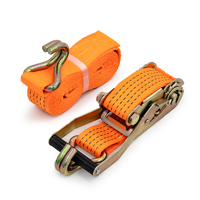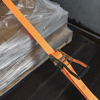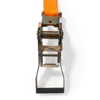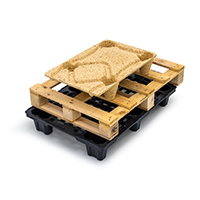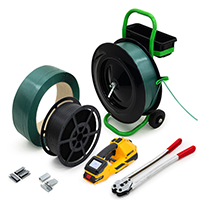Loading products
Ratchet Straps
Used to hold down equipment and cargo during transport, ratchet straps are fasteners that employ a ratcheting mechanism to lock and secure straps into place, featuring a ratchet on one end and a J hook on the other. This results in a more secure, tighter restraint system for loads, ensuring cargo remains safely on its carriage and the driver, any passengers, and other road users are also safe.
Ratchet straps are also known as tie down straps and lashing straps. We stock a 2-inch wide ratchet strap made from woven polyester webbing, which is used widely across a range of industries.
How much weight can a ratchet strap hold?
Our ratchet straps have a break strength of 5000kg. This is the greatest tension they are capable of withstanding without rupturing.
What are the rules for ratchet straps?
By law, ratchet straps must be strong enough to support the loads they carry from one location to another. If you transport steel, concrete, or scrap metal, it is worth also using corner protectors and webbing sleeves to protect straps from any damage.
It is important to never use a knot in any part of the strap that is under tension.
How long do ratchet straps last?
Ratchet straps are reusable and how long they last depends on the frequency of use and how they are looked after. If they are used daily and display wear and tear, it is best to replace them every six months to a year. For infrequent use, consider replacing every two to five years depending on wear and tear.
Who needs ratchet straps?
Ratchet straps are designed for cargo that is solid and heavy, although anyone who transports palletised goods, boxes, and stillages should use at least one strap per row.
How should ratchet straps be stored?
Storing ratchet straps improperly can lead to rapid wear and tear, so it is essential to store them correctly to ensure their longevity. Please see our blog on how to store ratchet straps correctly to prolong their use.
What is lashing capacity?
Typically measured in decanewtons, lashing capacity refers to the maximum tension a strap can withstand without breaking or tearing.
What are the benefits of using ratchet straps?
Ratchet straps offer distinct advantages in securing cargo, setting them apart from other strapping varieties. They can be independently secured to any anchor point, whether that’s on the side of a truck or on the floor, offering flexibility and adaptability.
Manufactured from strong and durable materials designed to resist water, UV, and other environmental elements, these heavy-duty straps have high abrasion resistance which ensures longevity and reliability. Despite being heavy-duty, ratchet straps remain lightweight and flexible, making them much easier to use and roll up for storage.
The ratcheting mechanism allows for effortless tightening, loading, and offloading when it comes to large and bulky cargo without needing a lot of manpower. The main advantage J hooks offer is their ability to quickly and easily attach onto the rings many vans and trucks have pre-installed.
The reliability of ratchet straps largely comes from the strength of its polyester webbing. This ensures cargo is securely tightened without sustaining any damage and can be transported in diverse weather conditions.
In essence, ratchet straps combine strength, durability, flexibility, and ease of use, making them indispensable tools in the transportation industry.







